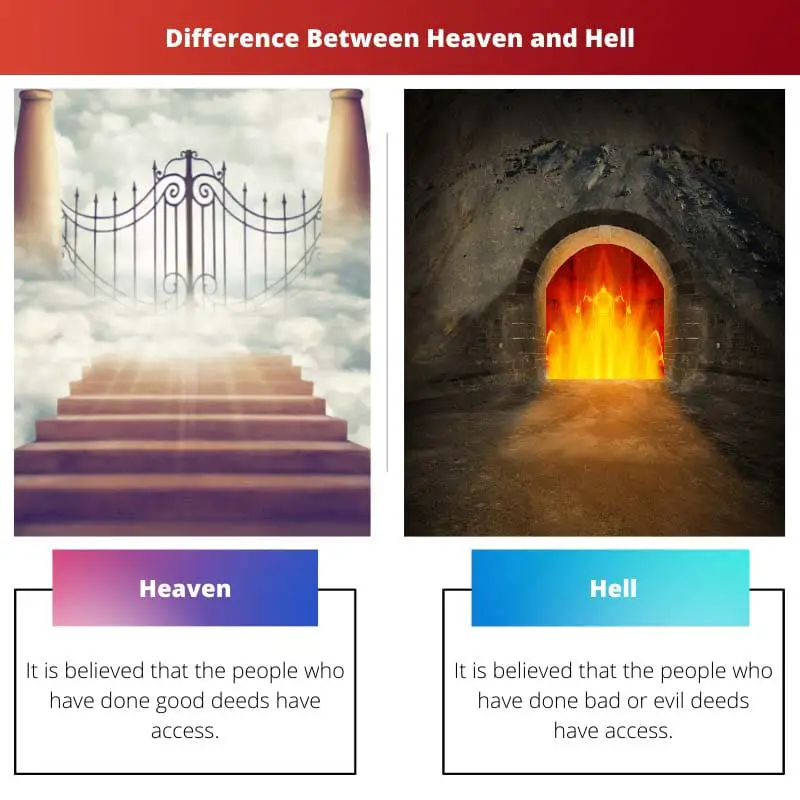It is a belief in different religions that, post-death, an individual is sent to another world. These worlds are either heaven or hell.
Key Takeaways
- Heaven is considered a paradise, while hell is considered a place of punishment.
- Heaven is associated with positive connotations, such as happiness and peace, while hell is associated with negative connotations, such as suffering and torment.
- Heaven is believed to be the destination of good souls after death, while hell is the destination of evil souls after death.
Heaven vs Hell
The difference between Heaven and Hell is that Heaven is a place for people who have carried out good deeds in their life. In contrast, hell is a place for people who have carried out evil deeds in their lifetime. There are no similarities between the two. They represent opposite worlds.

Heaven is said to be a place that is designed for good people to have a happy and peaceful afterlife in the presence of God.
Hell is said to be a place that is designed for bad people to suffer for their sins in the afterlife. It refrains their soul from being in the presence of God.
Comparison Table
| Parameters of Comparison | Heaven | Hell |
|---|---|---|
| Access | It is believed that the people who have done good deeds have access. | It is believed that the people who have done bad or evil deeds have access. |
| Administration | The administration is taken care of by the Angels. | The administration is taken care of by the Demons. |
| Rulers | The rulers of this province are Gods and Goddesses. | The rulers of this province are Devils. |
| Environment | The environment is filled with Happiness & Peace. | The environment is filled with Pain & Punishment. |
| Climate | The climatic conditions are Warm & Pleasant. | The climatic conditions are Hot & Dark. |
| Eternally | The souls of the individuals continue to be in the Presence Of God. | The souls of the individuals continue to be banished from the Presence Of God. |
What is Heaven?
According to many religious beliefs, Heaven is said to be a place for the people who have spent their life doing good deeds. The concept is very popular.
These acts don’t involve changing the world but even small acts like helping others, choosing the right paths, and so on.
Even sacrificing something or even your life for the greater good is painful. It is said these individuals are relieved from the pain and are at peace in heaven.
According to the most popular ones, it is filled with beautiful castles with gold, sparkling gems, good food, and peaceful music.

What is Hell?
Hell is another common belief in almost all religions. Hell is believed to be a place for people who have committed sinful and evil deeds in their life.
The people who turn out to be wicked. In life, there is a fair share of happiness and sadness. There are times when you are compelled to do wrong things, but it is in those times that you need to be righteous.
God has given me this life to be happy and help others. But when he sees this opportunity being wasted and used for evil purposes, the individual should be punished.
Hell is a very dark place filled with pain. It is said that the place has no beauty or peace, just torture. It is also considered to be very hot with lava lakes and filled with screams of other individuals.

Main Differences Between Heaven and Hell
- The climatic conditions of heaven are Warm & Pleasant. The climatic conditions of hell are Hot & Dark.
- In heaven, the souls of the individuals continue to be in the Presence Of God. In hell, the souls of the individuals continue to be banished from the Presence Of God.

- https://dl.acm.org/doi/abs/10.1145/317636.317790
- https://link.springer.com/content/pdf/10.1007/BF00762018.pdf

The descriptions of heaven and hell in different religious narratives are undoubtedly thought-provoking. It’s interesting to see how these beliefs shape the moral and ethical codes of various cultures.
The idea of heaven and hell compels us to consider the moral responsibilities of our actions and the consequences they might have in the afterlife. It’s a compelling topic that has inspired countless philosophical discussions.
The differences between heaven and hell are fascinating. It’s interesting how the concepts are similar across various religions, yet the details about each place can differ widely from one faith to another.
Heaven and hell are concepts that are deeply ingrained in human history, and discussions about these places bring up deep philosophical questions about morality, justice, and the nature of the universe.
It’s intriguing to see how the administration and rulers of these places are defined and the impact they have on the spiritual beliefs associated with heaven and hell.
The rich narratives and symbolic imagery surrounding heaven and hell in religious traditions are a testament to the profound significance of these ideas in shaping human beliefs, values, and cultural practices.
The contrasting beliefs about what happens to souls after death are a significant aspect of many religious traditions. The nuances of these ideas are deeply tied to cultural and historical contexts.
The underlying themes of mercy, justice, and personal responsibility are inherent in the concepts of heaven and hell. Delving into the philosophical and theological implications of these ideas is a thought-provoking intellectual pursuit.
The vivid descriptions of heaven and hell in various religious texts and traditions provide insight into the complex relationship between the divine and human experience, shedding light on the moral and spiritual dimensions of existence.
The comparison table provides a clear visual representation of the differences between heaven and hell, making it easier to understand the contrast between the two concepts.